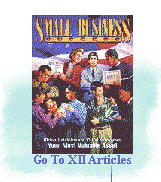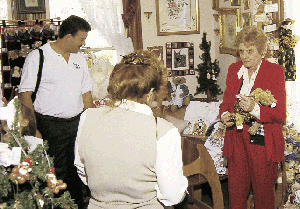


Want to build sales and customer loyalty with the biggest promotional bang any marketing program can provide? Try events.
Events deliver excitement-and demonstrate a commitment to serve your customers' interests and needs. That's why bookstores hold readings and book-signings. Kennels present evenings with doggie psychics and groomers. Manufacturers offer free technical seminars for customers. And stockbrokers lecture on the do's and don'ts of retirement planning.
Yet the big bang these events can generate may also necessitate big bucks, warns event planner Dina Jacobson, owner of Eventech in California's Silicon Valley. "The key to successful events," she explains, "is something most people neglect to do: establish a detailed timeline and budget that pinpoint exactly how much staff time and money your event requires. Some events are extremely labor-intensive; planning for tradeshows, for example, can take 200 hours if you're starting from scratch. So cost it out to know if you've got the necessary budget and if the event is worth the time and money that will be entailed.
"But even before you establish a timeline," Jacobson continues, "develop an overall marketing plan for your business and determine exactly how an event fits into it, for you can't just 'do a seminar' out of the blue. Once you know your marketing goals for an event, you can set measurable criteria for its success, such as the number of leads or customers it brings you or the volume of sales it generates. Tracking your results and comparing them against costs is the only way to know if you'd have been better off with, for example, a dollar-off coupon."
Remember, however, that compared to coupons, events can be so much more satisfying for customers and sales productive for your company that they merit extra expense. The following pointers will help you put the greatest planning efficiency into your events and get the greatest marketing mileage out of them.
Planning an Event That's Right For You
Event planning should start with an idea not about the kind of event you want to have, but about the kind of marketing job an event should do for you. So begin by asking yourself these questions:
• What specific group of people do you want to reach?
• What are their needs and interests? Which needs and interests related to your business are currently unmet?
• Do you want to attract a large crowd or a selective group?
• Are there negative perceptions of your company that you want an event to reverse or distinguishing features you want it to spotlight?
• Do customers need special information about your product or service in order to buy or use it effectively?
From the answers to these questions, determine the goals you want your event to achieve and then match these goals to an event. Events may include demonstrations of your products or services. Classes and seminars. Talks with civic groups. Book signings. Charity events presented on your premises. Contests, with awards celebrations. Holiday promotions or street fairs involving multiple businesses. Music, dance or theater events. Meet-a-celebrity gatherings. Open houses. Free tastings. Tradeshows.
And to increase the impact and reduce the cost of your event, suggests Kare Anderson in Walk Your Talk, team up with other companies. For example, several neighborhood businesses might offer a week-long Valentine's Day promotion including a cookbook author demonstrating romantic meals in a food store and romantic floral arrangements at a florist's. A lawyer and an accountant could jointly present "Know Your Money, Know Your Rights" talks to civic groups. Or a gas station might present a workshop on tire changing at a women's aerobics center.
The prerequisite to successful joint events, Anderson stresses, is that the partners have mutual markets and concerns and an equal commitment to working concertedly together to devise events that deliver mutual benefits and successes. Alternatively, businesses can team up with schools, cultural organizations or other nonprofits to present fundraisers, therefore benefiting a good cause while also enhancing their public image.
Bringing It Off Without a Hitch
As event planner Dina Jacobson emphasizes, good planning is essential for events, so start well in advance to develop a timeline and accompanying budget. In fact, Heather Brinton, who with her colleagues at the American Association of Medical Colleges in Washington, D.C. presents 60 meetings a year, begins 18 months before an event to mail save-the-date postcards to prospective attendees and start the program-planning process.
The most intensive work, however, comes in the last three or four months, entailing increasingly detailed task lists, complete with deadlines and check-offs, and culminating in a final week of task lists devoted to checks, double-checks and daily communication with the hotel hosting the conference. Despite the complexity, Brinton maintains, "if you plan carefully and do the work in advance, the meeting should come off well."
Also consider worst-case scenarios, suggests Kare Anderson, and have solutions ready. Moreover, build in features that contribute to success. To draw a large crowd, for instance, present established crowd magnets like giveaways, rides, demonstrations, celebrities and hands-on participatory activities. To ensure reaching your target audience, develop a comprehensive mailing list for invitations, news releases and other notices. And don't skimp on event staffing-including, if you'll need them, police.
In all, you must come to know your event so intimately in the planning stages that you can walk through it minute by minute in your mind and backtrack from it to figure out how to sequence the tasks for obtaining every resource-materials, services, staffing-that you'll need to make it work. Place these sequenced tasks in a timeline, and you'll have a powerful roadmap for organizing the event as well as estimating the costs.
Researching the Vital Answers
If the event you're contemplating is unusual or will require significant money or staff time, test the waters before getting underway to see if there's an audience for it. First, make sure you can specify your target audience so clearly, advises Dina Jacobson, that you can create a mailing list of individuals, news outlets and other sources to be contacted. Then administer a short written or conversational questionnaire to prospective attendees.
For a seminar, for example, ask these open-ended questions:
• What information would you like to see included in a seminar on [topic]?
• How much time would you spend learning this information?
• What meeting times are most convenient? Least?
• How much would you be willing to pay?
Although people respond to ideas more positively and enthusiastically in questionnaires than in real life, 10 to 20 questionnaires can nonetheless provide an accurate sounding on whether to proceed.
Above all, make sure events work hard for you as marketing tools-which means not only planning events strategically, but also including a sales message in them and measuring their outcomes. For example, give all event participants a coupon, advises Lisa Shaw in 1001 Ways to Market Yourself and Your Small Business, and end seminars with a gentle sales pitch-which may be given in the last 10 minutes by someone other than the featured speaker. Then follow up on events by counting your coupons, monitoring your sales and keeping a written log of the responses new customers give when asked how they heard about you.
Considering Other Options
Many companies today concentrate their marketing efforts on tradeshows, which Jay Levinson and Seth Godin, authors of Guerrilla Marketing Handbook, recommend as a way to meet the greatest number of real prospects. To evaluate the sales potential of tradeshows, they suggest, scout out shows the year before you plan to exhibit and talk with exhibitors in your business field about their results.
And if you decide to exhibit, promote your participation vigorously. Send invitations to prospects beforehand asking them to visit your booth and get a free product. Devise a contest that visitors to your booth can enter. Mail out news releases about the show, inviting the press to attend.
Design your display so that it fits your company's image and includes a participatory activity like a hands-on demonstration; staff it with congenial, well-informed personnel authorized to make on-the-spot sales. Prepare a box for visitors' business cards. Rent a limo that you'll lend out to your biggest buyers. Bring twice as many business cards as you think you'll need.
Equally important, counsels Lisa Shaw, be sure to follow up on the leads generated. One study, she reports, reveals an astonishing waste of opportunity: 80 percent of tradeshow leads are never acted upon.
Finally, don't confine the motivating power of events to customers alone. Have special events for employees too, urges Carolyn Greenwich in The Fun Factor: Games, Sales Contests and Activities That Make Work Fun and Get Results. Among her many suggestions are Appreciation Day, complete with a certificate of appreciation and a prize of cake, pizza or a day off, and the enticement of two movie tickets to employees who participate in brainstorming sessions on improving customer satisfaction.
For the reward of pleasing your staff is inestimable: no matter how much excitement events may generate, it takes an appreciated, motivated, genuinely enthusiastic employee to close the sale and encourage visitors to return.
|
|
Excerpted with permission from Small Business Success, Volume XII, produced by Pacific Bell Directory in partnership with the U.S. Small Business Administration.

